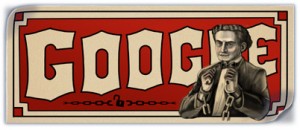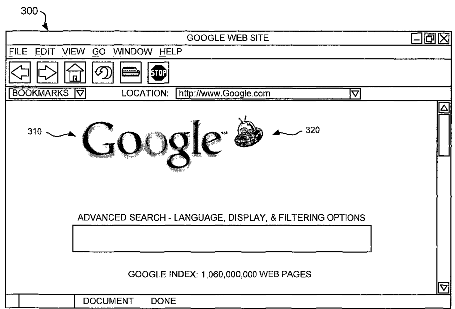 In a press release published on Monday, Google has stated that it has put in a $900 million bid for Nortel’s patent portfolio in the company’s bankruptcy auction. This would be the first bid in the case. The interesting thing is that Google claims that it wishes to acquire Nortel’s patents for defensive purposes, so as to avoid litigation and be able to freely develop new products and services. Google has been openly critical of the quality of patents for some time. In the press release, for instance, Google chastizes the Patent Office for issuing “low-quality software patents… which threaten innovation”. We will assume that the Nortel patents Google wishes to acquire do not fall into this category.. though we are not quite sure about Google’s recently issued patent for the “Google Doodle” disscusssed here previously.
In a press release published on Monday, Google has stated that it has put in a $900 million bid for Nortel’s patent portfolio in the company’s bankruptcy auction. This would be the first bid in the case. The interesting thing is that Google claims that it wishes to acquire Nortel’s patents for defensive purposes, so as to avoid litigation and be able to freely develop new products and services. Google has been openly critical of the quality of patents for some time. In the press release, for instance, Google chastizes the Patent Office for issuing “low-quality software patents… which threaten innovation”. We will assume that the Nortel patents Google wishes to acquire do not fall into this category.. though we are not quite sure about Google’s recently issued patent for the “Google Doodle” disscusssed here previously.
Google Bids $900 million for Nortel Patent Portfolio
Patent Office to Launch “Fast Track” Examinations
 As many inventors realize, the Patent Office takes its time when examining patent applications. In fact, it is downright SLOW. Usually it takes at least two years for the first office action to be mailed. Then another year or two until final disposition of the case.
As many inventors realize, the Patent Office takes its time when examining patent applications. In fact, it is downright SLOW. Usually it takes at least two years for the first office action to be mailed. Then another year or two until final disposition of the case.
However, starting on May 4th, the Patent Office will offer “fast track” examination. You guessed it, for an additional fee. According to the press release, for $4,000, the Patent Office will agree to process an application within 12 months. What this means is that the application will be either allowed, abandoned, or finally rejected within the 12 months. A finally rejected application can be appealed. The fast track program will be limited to 10,000 applications per year.
What has been the reaction? So far, from those who I’ve contacted, the main concern has been over the hefty fee. However, the Patent Office says it is working to get the fee reduced by 50% for small entities. This would make it a lot more attractive.
Kodak Shares Soar on ITC Patent Ruling
Shares of Eastman Kodak Company (NYSE EK) finished trading today up 10 percent after the U.S. International Trade Commission (ITC) agreed to re-examine a previous decision that iPhone and BlackBerry don’t violate patents relating to imaging technology awarded to Kodak. In the past two weeks, shares in Kodak have increased 30% in anticipation that royalties could be worth as much as $1 billion. Kodak has settled cases with LG Electronics and Samsung. The ITC’s final ruling is expected May 23.
‘Google Doodle’ Patent Issued
Today would be Harry Houdini’s 137th birthday… and to celebrate, Google has this image on its main search page.
Called a “Google Doodle”, the company periodically dresses up its traditional logo with additional artwork to celebrate or call attention to an event or holiday. It is highly unnusual in the corporate world to modify a logo due to the prevailing wisdom that this would confuse the buying public… but then again Google is not an ordinary company.
Now Google has further pushed the envelope by obtaining a patent for the Google Doodle itself (Patent No. 7,912,915 to Sergey Brin). Interestingly, this patent has a priority date of May 1, 2000, and was issued March 22, 2011–meaning that it took more than a decade to get through the Patent Office.
Fig. 3 from U.S. Patent No. 7,912,915 where ref. no. 310 is the company logo and ref. no. 320 is “one or more animated objects” which “may include images, video, and/or audio information and may be strategically located on the web page 300 to draw users’ attention to one or more portions of the web page 300”.
ICANN Approves .XXX TLDs
 After debating the issue for more than a decade, ICANN (Internet Corporation for Assigned Names and Numbers) has given final approval for the .XXX top level domain (TLD). So, in the near future, porn sites can use the .XXX TLD instead of .COM, if they wish. However, there is no requirement that adult sites have to use the .XXX TLD. And although 250,000 of .XXX domain names are on back-order, it is not expected that this will make much of an impact. It seems that users of adult sites prefer the traditional .COM and porn site owners are not going to change over to .XXX. On the other hand, it has been reported that domain name registrars (such as GoDaddy and Network Solutions) will collectively rake in about $20 million registering the new .XXX TLD.
After debating the issue for more than a decade, ICANN (Internet Corporation for Assigned Names and Numbers) has given final approval for the .XXX top level domain (TLD). So, in the near future, porn sites can use the .XXX TLD instead of .COM, if they wish. However, there is no requirement that adult sites have to use the .XXX TLD. And although 250,000 of .XXX domain names are on back-order, it is not expected that this will make much of an impact. It seems that users of adult sites prefer the traditional .COM and porn site owners are not going to change over to .XXX. On the other hand, it has been reported that domain name registrars (such as GoDaddy and Network Solutions) will collectively rake in about $20 million registering the new .XXX TLD.
DOJ and USPTO File Amicus Brief Supporting “Clear and Convincing” Standard of Proof
![]() Acting Solicitor General Neal Katryal filed an amicus brief in the case of i4i v. Microsoft in favor of keeping the present standard of proof in a patent infringement case. The amicus brief was also signed off by the U.S. Patent and Trademark Office. The i4i case involves a dispute involving alleged patent infringment by Microsoft of its XML technology in Microsoft Word. At issue in the case is the standard of proof for patent infringment which is currently the higher “clear and convincing” than “preponderance of evidence” in most civil cases (including copyright and trademark infringement). The US Supreme Court is scheduled to hear oral arguments in i4i v. Microsoft on April 18th and is expected to render a decision in the case by the end of June.
Acting Solicitor General Neal Katryal filed an amicus brief in the case of i4i v. Microsoft in favor of keeping the present standard of proof in a patent infringement case. The amicus brief was also signed off by the U.S. Patent and Trademark Office. The i4i case involves a dispute involving alleged patent infringment by Microsoft of its XML technology in Microsoft Word. At issue in the case is the standard of proof for patent infringment which is currently the higher “clear and convincing” than “preponderance of evidence” in most civil cases (including copyright and trademark infringement). The US Supreme Court is scheduled to hear oral arguments in i4i v. Microsoft on April 18th and is expected to render a decision in the case by the end of June.
USPTO Makes Special Accommodations For Applicants Affected by Japanese Earthquake
The US Patent and Trademark Office has announced that it is making special accommodations for patent and trademark applicants affected by the earthquake in Japan. These include allowing flexibility on deadlines for Office actions so long as the statutory six month reply period has not passed. According to the notice, upon applicant’s request, the Patent Office wil reissue the office action. In that case, the mailing date would be later, thus extending the deadline for response. The Patent Office also indicated that it would waive the surcharge for late payments of maintenance fees. Similar measures are being taken for trademark applicants affected by the catestrophic events in Japan.
America Invents Act would do away with Swearing Behind
During prosecution of a patent application, it is sometimes possible to present evidence to the examiner that a reference cited against the applicant was filed after the applicant conceived of the invention. The process of doing this is sometimes called “swearing behind” the reference. When a reference is successfully sworn behind, it is no longer considered prior art.
Although many supporters of the America Invents Act (S. 23) have tried to minimize the impact of doing away with “first to invent” by saying that there are only a few hundred cases of patent interferences each year (out of several hundred thousand patents issued), the impact would be far greater because eliminating swearing behind would have a far greater impact. I know that I have many times gotten a patent application allowed by swearing behind a reference; if the new law is passed, many patents that would otherwise be allowed will now be rejected. This is yet another reason to oppose the legislation. The bill was passed by the Senate and heads for the House for a vote. Please call your congressman to voice opposition.
Crowdsourcing Company Finds Prior Art
As reported in the Wall Street Journal’s Digits Blog, a “crowdsourcing” company known as Article One Partners has been asked to help find prior art to invalidate patents owned by Paul Allen’s Interval Licensing. As previously reported, Interval Licensing has sued nine technology companies (Apple Inc., Google Inc. and its YouTube subsidiary, Facebook Inc., Yahoo Inc., AOL Inc., eBay Inc., Netflix Inc., OfficeMax Inc. and Staples Inc.) for patent infringment.
Crowdsourcing refers to “the act of outsourcing tasks, traditionally performed by an employee or contractor, to an undefined, large group of people or community (a “crowd”), through an open call.” (Wikipedia). According to the Article One website, “Article One Partners uses the power of the global online community to research evidence that relates to the claims of novelty of selected patents.” Essentially, what this entails is for a large number of researchers to sign up for a prior art search project whereby those who find the most relevant prior art are monetarily rewarded. The entire process is done online, and researchers from around the world may participate.
Although the company says it provides payments as high as $50,000, it appears that in most cases the payments to the researchers are much lower, in many cases just $100. Somewhat vaguely, the company states that “about 5% of our annual net profits to our community based on a Researcher’s level of participation on Article One, as indicated by the points accumulated on our site.”
This seems like a good deal for the company, but not very good for the researchers who do most of the work. One wonders if this model would attract a sufficient number of good quality searchers. We remain skeptical.
Dutch Customs Seize Sony Playstations in Patent Dispute
As reported in today’s San Francisco Chronicle, Dutch customs police are seizing thousands of Sony Playstations as a result of a patent infringment case filed by LG against Sony. The lawsuit involves three of LG patents claiming Blu-ray technology. A copy of the Dutch complaint has been posted on the Foss Patents blog which is authored by IP activist Florian Mueller. According to the document, LG was given permission to have all Playstations at the Netherlands Sony Logistics Center seized between March 3rd and tomorrow. This is their main distribution point in Europe. Sony has appealed the case in the Haugue, and the hearing will be tomorrow.




